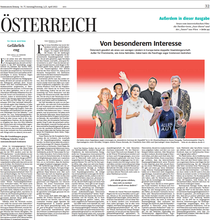The granting of citizenship in the special interest of the Republic is a special procedure. This granting of the citizenship is privileged in many respects compared to the other procedures. If granting the citizenship to a certain person is in the special interest of the Republic of Austria due to the extraordinary achievements made by him or her (and such are still to be expected), many of the otherwise necessary requirements are not relevant. Thus, in this case, applicants can
- retain their previous nationality
- waive the requirement of proof of German language skills
- become a citizen even without proof of a secure livelihood, and
- submit the application without residence in Austria at all.
Given these circumstances, this form of granting of the citizenship is always in the media's spotlight and sometimes causes astonishment and suspicion. The fact is, however, that a state can always have a "special interest" in people who have extraordinary achievements to show.
Although the article gives the impression that one could buy Austrian citizenship, this is not correct. In fact, a "golden investment" (in contrast to other states) is not sufficient and the requirements are more complex. Likewise, one cannot speak of a fast-track procedure, since the decision on such naturalisations requires a decision by the Federal Government. Although the relevant ordinance stipulates that such agents should be put on the agenda of the Council of Ministers regularily, in practice this happens rather irregularly. A procedural duration of several years is therefore not unusual.
Attorney-at-law Balazs Esztegar was not asked about this particular citizenship procedure, but about other possibilities of dual citizenship. Since the only occur about 20-30 cases of "special interest citizenships" per year, they are also not the most frequent cases for dual citizenship. Descent from different citizens, birth in a state with ius soli or the acquisition of citizenship by notification for descendants of Nazi expellees are much more frequent in practice.
The fact remains that dual citizenship under Austrian law is the exception rather than the rule, even if this may no longer seem entirely in keeping with the times in a world that has become international.





